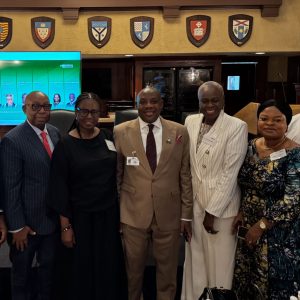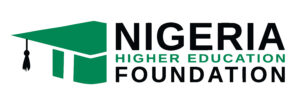 On Thursday, September 25, 2025, the Nigeria Higher Education Foundation (NHEF) convened global education leaders, philanthropists, and policymakers — including Nigeria’s Honourable Minister of Education, Dr. Maruf Tunji Alausa, CON — alongside Nigerian university leaders at the Yale Club in New York for the 2025 NHEF Higher Education Forum. Held under the theme “Driving Sustainable Growth – Strengthening Alumni & Advancement Infrastructure in Nigerian Universities”, the Forum explored how alumni engagement, philanthropy, and global best practices can drive long-term financial sustainability and competitiveness in Nigerian universities.
On Thursday, September 25, 2025, the Nigeria Higher Education Foundation (NHEF) convened global education leaders, philanthropists, and policymakers — including Nigeria’s Honourable Minister of Education, Dr. Maruf Tunji Alausa, CON — alongside Nigerian university leaders at the Yale Club in New York for the 2025 NHEF Higher Education Forum. Held under the theme “Driving Sustainable Growth – Strengthening Alumni & Advancement Infrastructure in Nigerian Universities”, the Forum explored how alumni engagement, philanthropy, and global best practices can drive long-term financial sustainability and competitiveness in Nigerian universities.
Opening the event, Mr. Walé Adeosun, CFA, Chairman of the NHEF Board of Directors, reflected on the Foundation’s 21-year journey — from its early work training Nigerian students through the NHEF Scholars Program to expanding its impact to medical doctors, faculty, and vice chancellors. He recounted how a pivotal NHEF initiative trained nine advancement staff from the University of Port Harcourt (UNIPORT) and placed them in short internships at Rensselaer Polytechnic Institute in the U.S., sparking Nigeria’s first structured university advancement campaign in 2006. That early success, supported by the MacArthur Foundation, laid the foundation for today’s conversation on sustainable funding.
Delivering the keynote address, Dr. Maruf Tunji Alausa, CON, Nigeria’s Honourable Minister of Education, commended NHEF’s work and pledged government support to strengthen university advancement. Dr. Alausa highlighted the urgent need to diversify university funding beyond government subventions, noting challenges such as the current Treasury Single Account (TSA) system, which delays access to donated funds. He proposed establishing dedicated endowment accounts that would generate returns while remaining accessible for institutional use, adding that the government is ready to back reforms that give alumni confidence to donate.
Dr. Alausa also announced that President Bola Ahmed Tinubu has approved the creation of a National Research Development Fund, designed to provide sustainable support for research and education. He urged Nigerian universities to set up functional alumni offices, operate with transparency, and actively cultivate trust with graduates and donors.
The Forum’s first panel session, “State of Advancement Offices in Nigeria,” featured Professor Owunari Abraham Georgewill, Vice Chancellor of the University of Port Harcourt (UNIPORT), in a conversation moderated by Dr. Ifeoma Nwokorie, Vice Chair, NHEF. Professor Georgewill traced UNIPORT’s advancement journey — from its MacArthur-funded Advancement Centre to the creation of the UNIPORT Foundation, which now supports over 2,000 students annually through scholarships funded by alumni. He identified trust deficits and lack of independent legal frameworks as major barriers to sustained alumni giving and called for structures that safeguard donor funds. Forum attendees shared insights on tax incentives, legacy giving, and how improving alumni experiences can drive stronger giving cultures.
The second panel, “Global Best Practices in Advancement,” moderated by Dr. Gbenga Ogedegbe, Director, Institute for Excellence in Health Equity NYU Grossman School of Medicine, brought together Gbenga Oyebode (Board of Trustees, Ford Foundation), Dr. Funmi Olopade (Associate Dean for Global Health; Walter L. Palmer Distinguished Service Professor; Director, Center for Clinical Cancer Genetics, University of Chicago; alumna, University of Ibadan), and Rob Henry (Vice President, People, Culture & Talent Council for Advancement and Support of Education). Drawing from international experience, the panelists discussed how philanthropy and advancement have transformed leading global universities and what Nigeria can adapt.
Mr. Oyebode emphasized the importance of building credible advancement offices and donor confidence, while also calling for policy incentives to attract diaspora giving. Dr. Olopade urged Nigerian universities to digitize alumni records, foster a culture of giving early, and rebuild trust with graduates, pointing out that diaspora remittances already sustain the economy and could be channelled into education if reliable systems exist. Rob Henry shared insights on data-driven alumni engagement, the impact of student experience on future giving, and the professionalization of advancement offices as key pillars of long-term success.
The Forum concluded with the presentation of the NHEF Roadmap for the Future of Advancement in Nigeria, led by Mr. Walé Adeosun and Dr. Maruf Tunji Alausa. Mr. Adeosun reflected on NHEF’s 21-year journey and noted that this was the first time a sitting Nigerian Minister of Education had fully participated in the program. He underscored the importance of sustainable funding models and cited Dr. Philip Ozuah’s $1 million gift to the University of Ibadan as a powerful example of how alumni philanthropy can transform Nigerian universities when the right structures exist.
Dr. Alausa pledged the Federal Ministry of Education’s support to strengthening advancement offices and announced plans to circulate a formal letter detailing the roadmap and convene a national meeting of Vice Chancellors to accelerate the adoption of structured advancement systems across the country. He emphasised that alumni support and endowment structures must be strategically developed to complement government funding and drive long-term sustainability for Nigerian higher education.
“This moment marks a turning point for sustainable funding in Nigerian higher education,” said Mr. Adeosun, affirming NHEF’s continued role in driving alumni engagement and institutional resilience. Dr. Alausa reiterated the Federal Government’s readiness to work with universities and the NHEF to unlock alumni and philanthropic capital that will shape the future of Nigerian higher education.
………………………………………………………………………..
About the NHEF
The Nigeria Higher Education Foundation (NHEF) was established in 2004 with support from the John D. and Catherine T. MacArthur Foundation. Since then, the NHEF has been committed to enhancing the capacity of higher education institutions in Nigeria by strengthening advancement structures, empowering students and young professionals, and cultivating alumni networks as long-term partners in institutional growth. Over the past 21 years, the NHEF has trained thousands of students, young professionals, faculty, and university leaders while fostering global partnerships to support Nigeria’s higher education sector. For more information, visit www.thenhef.org.

